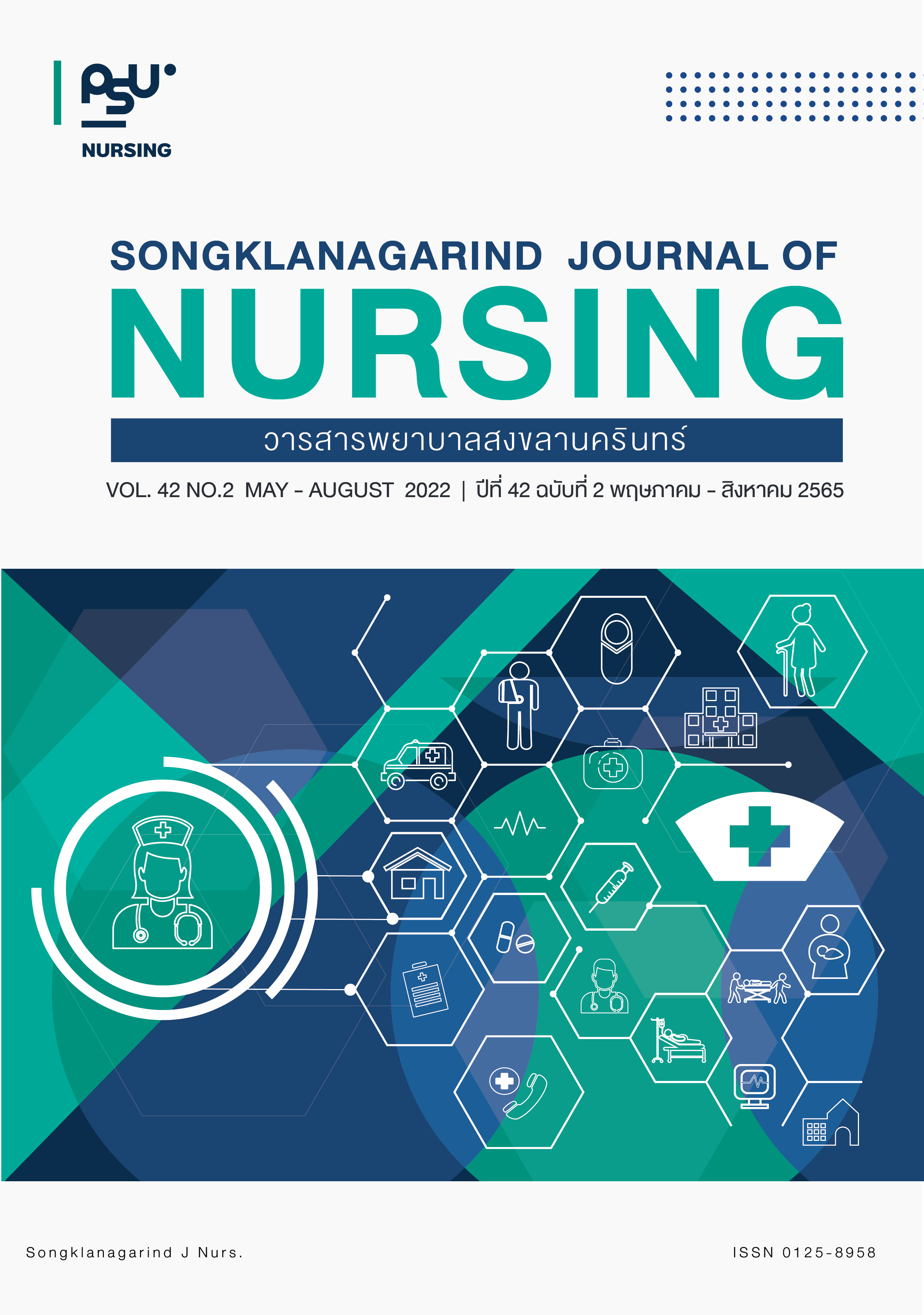Factors Predicting Nursing Students’ Learning Outcomes Through Online Learning during COVID-19 Pandemic
Main Article Content
Abstract
Objectives: This research aimed to examine factors predicting learning outcomes among nursing students through online Learning during COVID-19 Pandemic. Methods: The 212 samples were randomly recruited from the 3rd and 4th years nursing students, Bachelor of Nursing Science program, Faculty of Nursing Burapha University. Self-reported questionnaires were used for data collection including 1) personal data record form, 2) online learning behavior questionnaire, 3) perceived online teaching competency questionnaire, 4) online learning support questionnaire, and 5) learning outcomes questionnaire. The content validity of second to fifth section confirmed by three experts: CVI, yielding values of .90, .83, .95 and .93 respectively. The reliability of the questionnaires was tested using Cronbach’s alpha coefficient, yielding values of .86 .95 .83 and .96 respectively. The data was collected by using online questionnaires. Data were analyzed using descriptive statistics and stepwise multiple regression. Results: The results showed that nursing students’ average score of learning outcomes was 4.09 (SD = .46). Perceived online teaching competency and online learning behavior could explain 23% of the variance in learning outcomes among nursing students (R2 = .23, p < .01). Conclusion: These findings suggest that faculty of nursing should promote online teaching competencies for instructors and support students’ appropriate online learning behaviors, which would maximize nursing students’ learning outcomes.
Article Details

This work is licensed under a Creative Commons Attribution-NonCommercial-NoDerivatives 4.0 International License.
References
Tantranont K, Tuarnrat W. Effects of blended learning on learning outcomes in an epidermiology course. Nursing J. 2017; 44(3): 144-52. Thai.
Thongtanunam Y, Sukrapat W, Wankrathok S, et al. Effects of a problem based learning online program for nursing students during COVID-19 global pandemic on learning outcomes according to Thai Qualifications
Framework for higher education. NJPH. 2021; 31(2): 10-25. Thai.
Chomnawang Y. The effects of online learning with class start platform for developing self-directed-learning of undergraduate students. EDU-RMU. 2021; 18(1): 95-04. Thai.
Hofer SI, Nistor N, Scheibenzuber C. Online teaching and learning in higher education: Lessons learned in crisis situations. Comput Human Behav. 2021; 121: 106789. doi: https://doi.org/10.1016/j.chb.2021.106789.
Hung ML, Chou C. Students’ perceptions of instructors’ roles in blended and online learning environments: A comparative study. Computers & Education. 2015; 81: 315- 25. doi: http://dM.doi.org/10.1016/j.compedu.2014.10.022.
Suwannatthachote P. Online instructor competencies and roles: Instructor presence and learner support. J of GradVRU. 2018; 12(2): 244-56. Thai.
Amprasit A. Factors affecting to learning and guidelines for development of medical coding learning. SCAJ. 2021; 7(2): 62-73. Thai.
Benjakeeree D, Chayrassameekul W, Chumde T, et al. The factors predicting on learning achievement of undergraduate students in The Mahamakut Buddhist University: A multiple regression multilevel analysis.
RMUTSB academic journal (humanities and social sciences). 2017; 2(2): 136-48. Thai.
Petchkong J. Causal factors affecting to learning outcomes of nursing students: Boromarajonani College of Nursing Chakriraj. EAUHJSci. 2016; 10(2): 199-11. Thai.
Lertsakornsiri M, Narumitlert J, Samutpradit K. Factors effecting on learning behavoirs with students’ online learning in Saint Louis College from COVID- 19 situations. J Health & amp; Health Manag. 2021; 7(1): 13-27. Thai.
Songthai N, Yottavee W, Saengkhiew P. Factors influencing the online learning behavoirs of nursing students: The lower northern region. BCNUT J Nurse. 2021; 13(1): 198-209. Thai.
Alotaibi KN. The learning environment as a mediating variable between self-directed learning readiness and academic performance of a sample of Saudi nursing and medical emergency students. Nurse educ today. 2016; 1(36): 249-54. doi: https://doi.org/10.1016/j.nedt.2015.11.003.
Chevasutho R. Relationship between teaching quality, learning behavior and learning efficacy as observed amongst third-year nursing science majors at Boromarajonani College of Nursing, Chon Buri. TJNC. 2012; 27(4): 43-56. Thai.
Tangdamnoensawat S. The relationship between learning behavior and learning outcome follow Thai Qualifications Framework for higher education of student in situational english semester 2, academic year 2013. Journal Graduate Suan Dusit University. 2016; 11(2); 223-30. Thai.
Lertsakornsiri M. The relationships between selected factors and nursing students’ learning outcome in maternal-newborn and midwifery nursing practicum I at Saint Louis College. JRTAN. 2014; 15(3): 321-30. Thai.
Irawan AW, Dwisona D, Lestari M. Psychological impacts of students on online learning during the pandemic COVID-19. KONSELI: Jurnal Bimbingan dan Konseling (E-Journal). 2020; 7(1): 53-60. doi: https://doi.org/10. 24042/kons.v7i1.6389.
Oducado RM, Estoque H. Online learning in nursing education during the COVID-19 pandemic: Stress, satisfaction, and academic performance. JNP. 2021; 4(2): 143-53. doi: https://doi.org/10.30994/jnp.v4i2.128.
Ministry of Education. Announcement of the Ministry of Education: Thai qualification framework for higher education in Nursing Science 2017 [Internet]; 2017. [cited 2019 Sep 4]. Available from: https://www.tnmc.or.th/images/userfiles/files/Edit(1).PDF
Tsang JT, So MK, Chong AC, et al. Higher education during the pandemic: The predictive factors of learning effectiveness in COVID-19 online learning. Educ. Sci. 2021; 11(8): 446.
doi: https://doi.org/10.3390/educsci11080446.
Setthachotsombut N. Effect of lesson plan design and development of information technology media to learning outcomes. Wichcha J NSTRU. 2019; 38(2): 93-103. Thai.
Thaiwong S. The effects of group rational emotive behavior counseling on study strategies and the level of achievement in the probation students [master’s minor thesis].[Bangkok]: Ramkhamhaeng University; 2001. 141 p.
Prasertsong C, Sanghirunruttana J, Kladkaew P. The factor related to stress of online learning due to the COVID-19 situation among nursing students. J Somdet Chaopraya Inst Psychiat. 2021; 15(1): 14-28. Thai.
Zeglen E, Rosendale JA. Increasing online information retention: Analysing the effects of visual hints and feedback in educational games. Journal of Open, FleMible & Distance Learning. 2018; 22(1): 22-33.
Sukcharoen P, Kaewsuk C, Lukthitikul S, et al. Lessons learned from nursing students’ eMperience in online learning during the outbreak of the 2019 novel Coronavirus disease (Covid-19). JPMC. 2021; 38(2): 224-31. Thai.
Watanakanjana C, Trichan P, Puapornpong T, et al. Effectiveness of online-learning of lecturer’s competence and assessment: A case study of Faculty of Management Science, Nakhon Pathom Rajabhat University. SSJPRN. 2021; 3(2): 1-13. Thai.
Srisai S. Competency factors affecting learning outcomes and perception in terms of university overview of students at Chulalongkorn University. eJES. 2016; 44(4): 188-205. Thai.


